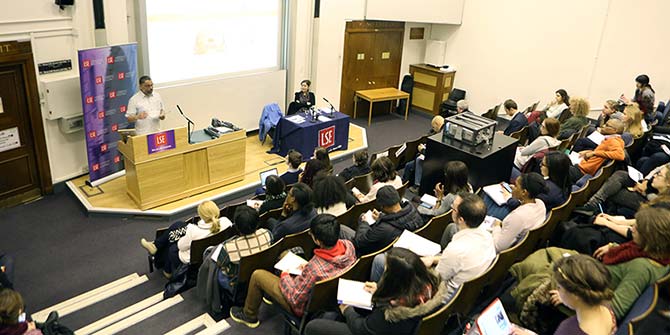In the second of a series of articles ahead of the 2016 LSE Africa Summit, Corey Holmes explores the power of social media to mobilise against disenfranchisement.
South Africa has always been a protesting nation that would fight for a righteous cause. The Sharpeville Massacre of 1960 when blacks refused to carry passbooks in their own country, or the Soweto Uprisings in 1976 which saw students being gunned down by the South African police for wanting equal education, shows the historic past of the disenfranchised. By 2015, the explosion of social media (Twitter, Facebook, Instagram, and Whatsapp) had given the disenfranchised in South Africa a powerful voice that can reach across the globe.

The #FeesMustFall movement began in October 2015 in response to an increase in fees at South African universities. The protests also called for low-wage university staff working for private contractors to be employed directly by universities. Students at the University of Witwatersrand initiated the protest, and it spread to the University of Cape Town, Rhodes University, and ultimately to other universities across the country. The University cited that school fees were raised because of the Rand’s weakness in the global economy, a 6% inflation rate, a 7% faculty increase to maintain the best teachers, and a utilities increase (many South Africans do not have power, and if they do, it is sporadic). The University of [1]Witswaterand officials stated that receiving eight billion rand from the government annually would cover every student’s tuition in the country (Provost 2011). South Africa spends 0.75% of its gross domestic product on college education, which is more than the United States at 2.7% but lower the than the African median percent of 25.4% (Snyder and Dillow 2015)[2].
The power of globalisation was revealed with the #BlacklivesMatter movement. Young South Africans were paying close attention to the movement and seeing how social media could be used as an organising method. The #FeesMustFall movement not only galvanised students and disgruntled contracted employees, but it spread throughout the continent and even in the West. At Howard University, many student activists used Twitter, Facebook, and Instagram to post pictures and messages about the matter. The isiZulu and Kiswahili students took a picture in solidarity and posted it on Twitter and Facebook.
Social media is a key platform where organisations recruit people to commit transnational (ivory and heroin smuggling) and terrorist crimes. Technology gives people the ability to connect farther and faster than ever before, and some exploit it.
“Section 29 under Education of the South African Constitution states, “Everyone has the right to a basic education, including adult basic education; and to further education, which the state, through reasonable measures, must make progressively available and accessible. Everyone has the right to receive education in the official language or languages of their choice in public educational institutions where that education is reasonably practicable. In order to ensure the effective access to, and implementation of, this right, the state must consider all reasonable educational alternatives, including single medium institutions, taking into account equity; practicability; and the need to redress the results of past racially discriminatory laws and practices. Everyone has the right to establish and maintain, at their own expense, independent educational institutions that do not discriminate on the basis of race; are registered with the state; and maintain standards that are not inferior to standards at comparable public educational institutions.” (Sabinet.co.za 1996).[3]
I disagree with the #FeesMustFall movement in this regard: I think that the South African government should concentrate on educating primary and secondary students instead of those in the tertiary system. I would solicit funds from multinational companies, the government, and private sector and distribute them to urban and rural schools, primarily focusing on young girls and technology. It is my belief that young girls are unequally treated, especially in rural patriarchal environments. Exposure to equitable education and technology would allow young girls to go beyond secondary school, which could help decrease domestic violence and rape, and in turn combat HIV/AIDS.
[2] Snyder, T, and S. Dillow. 2015. Digest of Education Statistics, 2013. Compendium, Washington: NCES.
[3] Sabinet.co.za. 1996. Constitution of the Republic of South Africa. Pretoria, Gauteng, January 18.
The 2016 LSE Africa Summit will take place on 22nd – 23rd April 2016 in the Sheikh Zayed Theatre at LSE. Follow this link to find out more about the Summit and to register.
Corey Holmes is a second year PhD student in the Department of African Studies & Research at Howard University. He is studying youth unemployment in South Africa. He is also a Preparing Future Faculty Fellow. Corey has worked for the Department of State in the Bureau of African Affairs as a South African Desk Officer and a Public Affairs Officer.
The views expressed in this post are those of the authors and in no way reflect those of the Africa at LSE blog or the London School of Economics and Political Science.




I wonder how much focus on tertiary education creates unrealistic expectations about jobs that follow, mismatches on graduation – certainly true in India, not so sure in SA…
Primary/secondary certainly woeful in some areas, perpetuating apartheid – but less likely to have a campaigning identity/voice. Painful seeing fights for a standard/model of education already dated elsewhere.
Anand,
Sorry for the delay, I was taking comprehensive exams. I visited Mumbai with the South African Presidential delegation in 2010. I can tell you from my research and friends in country, the disparity lies within the system. Public education is inadequate and access to technology is scarce in rural areas. I would like some on the emerging markets (BRICS) to go the German route (trade/develop a skill). As W.E.B. Dubois stated, the university is not for everyone. But I know everyone can add value to their society.